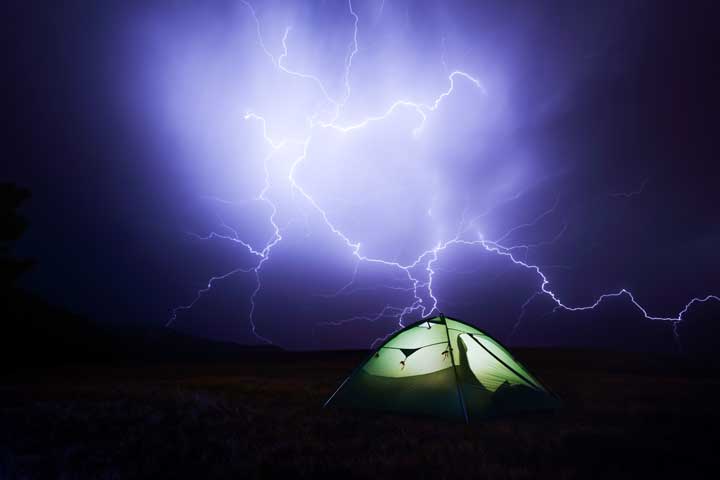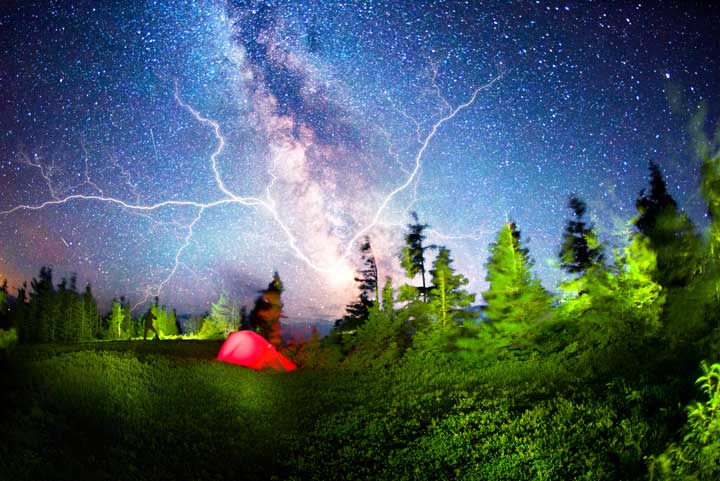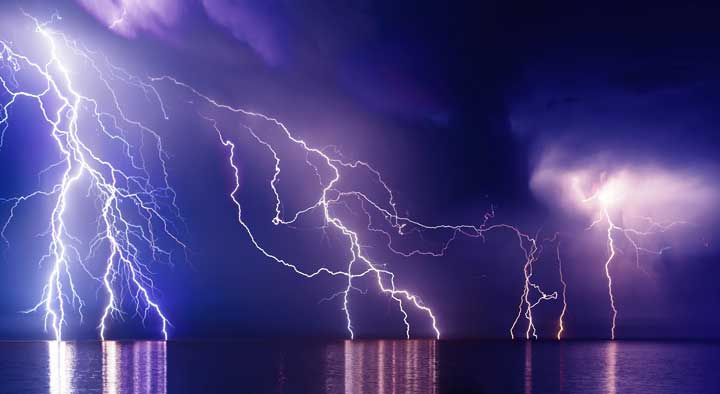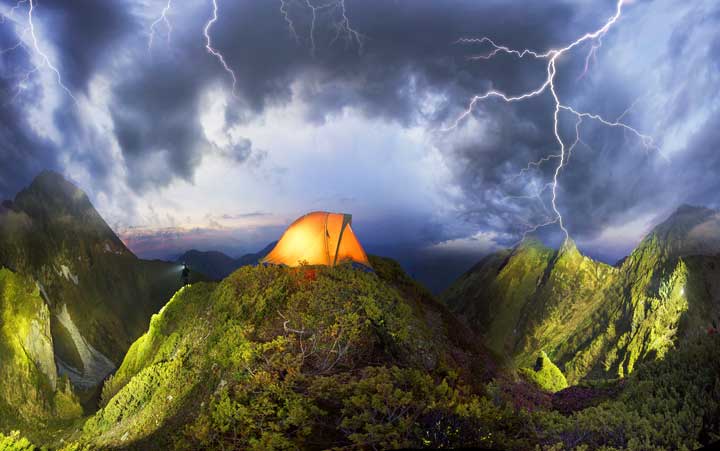Do tents attract lightning? If you thought camping in a tent is safe during a lightning storm, think again. While tents don’t attract lightning, your tent can’t protect you from lightning. Learning more about how to stay safe from lightning while tent camping is essential to your safety.
Is Camping in a Tent Safe?
Camping in a tent during a thunderstorm isn’t safe and comes with risks. According to The National Weather Service, your tent doesn’t provide any protection from lightning at all. If you have no choice but to camp during a lightning storm, it’s important to be wise about where you set up camp.

What Are Your Chances of Getting Struck By Lightning?
According to a study presented by Ronald L. Holle at the 20th International Lightning Detection Conference, some of the main differences between lightning death rates a hundred years ago and now and between less developed countries and more developed countries boil down to improvements in three things:
- More substantial housing options
- Improved meteorological forecasts and warnings
- Increased education, planning, and detection related to lightning
Lightning Statistics in the USA
Here are some statistics from the National Weather Service related to yearly lightning deaths in the US:
- The average number of lightning deaths per year: 27
- The average number of lightning injuries per year: 243
- Your chances of being struck by lightning each year: 1 in 1,222,000
- Your chances of being struck by lightning in your lifetime: 1 in 15,300
- Odds you know someone who will be struck by lightning: 1 in 1500

Where Do Most Lightning Strikes Occur?
The National Lightning Safety Council analyzed where most lightning deaths occurred in the US between 2006 and 2019. Two out of three were doing outdoor activities, mostly near water, such as fishing, boating, swimming, or beach activities.
These were the Council’s findings on lightning-related deaths relevant to camping activities:
- More than 70% occurred between June and August, which corresponds to the most lightning activity in the US and more outdoor leisure activity.
- 10% occurred while fishing (40 total).
- 25% occurred on a beach (25 total).
- 8% occurred while camping (21 total).
- 4% occurred while walking (16 total).
Do Tents Get Struck by Lightning?
Yes, tents can get struck by lightning. According to the National Lightning Safety Council, many camping lightning victims were in tents only steps away from their vehicle, which could have provided a safe place during the storm.
Sometimes the victims didn’t realize that a storm was coming because trees or mountains obstructed their view of the sky, and they weren’t able to check the weather because their cell phone was out of range. Other times they just ignored the impending storm and decided to camp anyway.
Is it Safe to be in a Tent During Lightning?
No, it’s not entirely safe. You’re taking a chance your tent could be hit by lightning during a thunderstorm. If you have no choice but to be in a tent during a lightning storm, your safety increases or decreases based on where you pitch your tent.
I once stupidly set up my tent on a lake beach under a tall tree because it was a pretty spot. Then I ended up spending the entire night in my vehicle because lightning was lighting up the sky all night. I felt a little silly because nobody else on the beach was seeking shelter, but I ultimately decided it was better to be safe than sorry.

How Do You Protect Yourself From Lightning While Camping?
Applying Holle’s information about the factors that have led to fewer lightning fatalities over time and in developed countries, you want to focus on the following things to help keep you safe:
- Educating yourself about lightning safety
- Paying attention to weather reports
- Improving where you place your tent or seeking shelter
Tips for Staying Safe from Lightning While Camping
According to the National Lightning Safety Council, the following factors can help most to prevent lightning fatalities:
- Consider how vulnerable your activity is to lightning. Move to a safe location as soon as possible. Avoid fishing, swimming, being on a beach near a body of water, walking in open fields, or hiking during a lightning storm.
- Be willing to cancel or postpone activities. Nobody wants to change your plans, but you need to balance safety with convenience. Cancel plans for water activities and leave or hike out before the storm hits if possible. Reschedule your trip, or stay in a hotel for the night.
- Stay aware of the weather. Pay attention to weather reports before leaving for your trip, and check your weather app for lightning notifications. If you’re going camping out of cell range, bring a satellite GPS device with weather forecast capabilities.
- Be willing to move to a safe place before it’s too late. If you have advanced warning of an impending storm, be sure to give yourself enough time to get to your tent, break down your camp, hike out, or move to a vehicle or building before the storm hits. If your tent is in a vulnerable location, consider getting wet in a safer location.
What Is the 30-30 Rule for Lightning?
If you are outside and see lightning, the CDC suggests following the “30-30 rule.” After you see lightning, count to 30. If you hear thunder before you get to 30, you should go indoors (whether that’s a building or vehicle). You also shouldn’t go outside again until 30 minutes after the last time you hear thunder.
What Attracts Lightning?
A common myth is that metal attracts lightning, but that’s not necessarily the case. Metal at a higher height may be more likely to get struck, but metal closer to the ground may not. Let’s break down some of the common myths of what attracts lightning.

Do Tents Attract Lightning?
Tents don’t attract lightning. If you’re worried about the metal in your tent attracting lightning, don’t. What is more relevant is the location of your tent.
Do Cell Phones Attract Lightning?
Cell phones don’t attract lightning either. According to John Jensenius from the NOAA National weather service, “Cell phones, small metal items, jewelry, etc., do not attract lightning. Nothing attracts lightning. Lightning tends to strike taller objects.”
Where are the Best and Worst Places to Pitch a Tent During a Lightning Storm?
According to The National Oceanic and Atmospheric Administration (NOAA), no place outdoors is 100% safe from lightning. NOAA has a visual that explains how risky outdoor locations are during a lightning storm. It’s a good idea to keep these locations in mind every time you set up camp in case an unexpected storm hits.
Extremely Dangerous Places to Pitch a Tent During a Lightning Storm
You should avoid being in or pitching your tent in these locations during a thunderstorm:
- Mountain peaks (the tallest peaks are the most dangerous)
- Rock shelters, cave entrances, and shallow caves
- Wide-open areas
- Next to a lone tree or tree taller than other nearby trees
- Beside or on a body of water

High-Risk Places to Pitch a Tent During a Lightning Storm
Leave these areas before a thunderstorm hits and avoid pitching your tents in these locations:
- On the side of a mountain
- Mountain ridges
- Near tall objects
- On the windward side of a mountain
- Near trees beside the edge of the water
Least-Objectionable Places to Pitch a Tent During a Lightning Storm
While these spots are still riskier than being indoors, they’re safer options if you have no choice but to stay in your tent:
- Between shorter trees
- In a valley between hills or mountains
Final Thoughts
Now that you know more about lightning safety while camping, you’re not as likely to make a deadly mistake. Do tents attract lightning? No, but they’re not lightning-proof. Learning when to shelter and where to pitch your tent during a lightning storm can keep you from becoming a crispy critter.





Thanks for recommandations so i can go out with an umbrella when lightning.